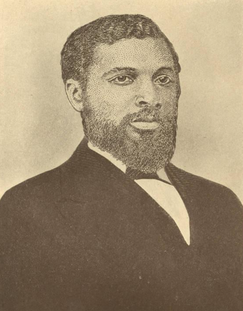Thanks largely in part to the so-called Ku Klux Klan bills, “designed to eliminate extralegal violence and protect the civil and political rights of four million freed slaves”', many freedmen were now able to vote without fear of violence. Rapier won the election to the Second Congressional District by 55 percent of votes and became appointed to the Committee on Education and Labor. He also spent a majority of his time fighting for the passage of the Civil Rights Bill of 1875. On one occasion he gave a speech explaining the absurdity of his situation. To illustrate his point he describes how white ex-convicts will receive all the luxuries of other white citizens while he, a congressman, “will be forced into a dirty, rough box with the drunkards, apple sellers, railroad hands, and next to any dead that be in transit, regardless of how far decomposition may have progressed.” The bill would later be struck down by the Supreme Court.
Despite his moderate views and overall desire to help both the black and white population, the Klan continued their threats and violence. In the 1870s the support for Reconstruction Era policies began to wane and Rapier’s cries for federal protection for African Americans to vote fell on deaf ears. On election day in 1874 in Eufaula, Alabama seven or eight black men died and many more wounded from a white militia group determined to prevent another republican from winning. This is just one example of a white terrorist organization using deadly force on unarmed black voters. Rapier’s opponent democratic attorney and ex-Confederate major Jeremiah Williams, received 51 percent of the vote. After his defeat, Rapier would later work for the Internal Revenue Service until his death from pulmonary tuberculosis in 1883.
Although Rapier did not get legislation passed improving the lives of Alabamians, he should be remembered as a politician solely dedicated to bettering the lives of others. He earned the respect of his fellow constituents and also of several other black congressmen elected during the Reconstruction Era. Rapier and those like him helped pave the way for future African American leadership.
Additional Information:
- Congressman James T. Rapier, "Half Free, Half Slave": https://www.blackpast.org/african-american-history/1875-james-t-rapier-half-free-half-slave/
- “James T. Rapier” Encyclopedia of Alabama: http://encyclopediaofalabama.org/article/h-3272
Author


 RSS Feed
RSS Feed